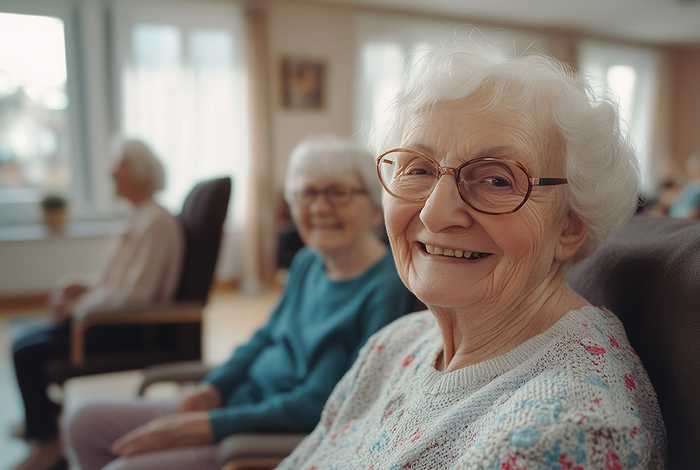Posted by Janine Griffiths
5 Stages of Palliative Care

Palliative care is a compassionate journey, not just an end-of-life solution. It is often mistakenly categorised as being exclusively focussed around caring for a person in their final days.
However, there are 5 stages of palliative care, which can help to ensure that those facing terminal illness receive the comfort and care they need to manage their quality of life.
These stages can take place over a number of years and understanding what palliative care is and what it involves can make it much easier to plan the medical, emotional, and spiritual care that is needed.
In this blog, we will outline the 5 stages of palliative care and what it entails.
What is palliative care?
The term palliative care can take on different meanings depending on who you ask. This is one of the reasons it is so important to define it. Often it is associated with grief and losing loved ones.
However, the truth is that palliative care is a specialised medical approach aimed at improving the comfort and wellbeing of those with serious, often terminal, illnesses. It is applicable to anyone with chronic, or life-limiting diseases that cannot be cured.
It is a treatment plan that focuses on relieving symptoms, pain management, and addressing emotional, spiritual, and social needs.
Unlike curative treatment, palliative care can be provided alongside other medical interventions at any stage of illness. Its goal is to support patients and their families, ensuring comfort and dignity throughout the illness.
Due to the misconceptions often associated with palliative care, many elderly individuals with chronic or life limiting illnesses mistakenly believe that palliative care is not relevant for them.
However, in reality, palliative care can begin soon after a diagnosis or during the initial stages of treatment. Some individuals can also live for many years while receiving palliative treatment.
Why is palliative care needed?
Understanding the 5 stages of palliative care can ensure that you or your loved ones are as comfortable and stable as possible throughout the illness. Not only can it help you determine when symptoms are deteriorating, it can also take care of the emotional as well as physical needs of the individual concerned.
Palliative care focuses on providing comfort and wellbeing as well as compassionate support and ensuring your loved one needs are met by a dedicated healthcare team.
The goal of these professionals is to support you during this difficult time while offering medical expertise, emotional support, companionship, and in-home services to improve quality of life and allow you to cherish time with your loved ones.
5 stages of palliative care
The 5 stages of palliative care guide the journey of managing serious illness, focusing on comfort, dignity, and improving quality of life. We discuss them in further detail below:
1. Develop and implement a care plan
The first step is to work with a GP, care providers and family to develop a detailed overview of the illness and how the individual wishes to be treated. This initial plan will also look at any legal decisions, the expected progression of the illness, plus any medication or treatment being taken. The plan would also document how the individual would like to receive care both at the hospital and at home. As part of this process, the care team will support the individual to remain as independent as possible.
2. Emotional preparation and adjustment
In this stage of the process, the palliative care team will work together with the individual and their family to offer emotional support, which can come in the form of therapy, counselling, and if requested, support from a religious or spiritual professional.
3. Early stage treatment and care
Early stage treatment is when healthcare professionals will work with the individual to help them remain as comfortable and independent as possible. The focus of this stage will be to increase the quality of life of the individual involved and provide symptom relief. At this point, symptoms may be deteriorating, with severe medical conditions beginning to develop. Healthcare professionals may provide specialist equipment, and clinical care to support the person involved. During this time, the individual may transition to hospice care, hospital or care at home, depending on the wishes, needs and preferences of those involved.
4. Late stage treatment and care
In late stage treatment, death is expected within days or weeks, so the focus shifts entirely to end-of-life care, emphasising the patient's comfort, managing severe symptoms, while addressing psychological and spiritual needs. This is a time when an individual may consider communicating their final wishes. End of life medication may be needed during this stage.
5. Bereavement
There are very few things in life that can take an emotional toll on people as much as the death of a loved one. This is why the final step in the 5 stages of palliative care is such a critical and sensitive one for families.
After the patient’s death, the bereavement stage is one in which support is offered to the family. This phase involves grief counselling, support groups, and ongoing emotional assistance, which may last several months to a year, depending on the needs of the family.
The role of care homes in palliative care
Care homes can play an important role in facilitating palliative care. If an individual is already living in a care home, they may be receiving palliative care there. On the other hand, a decision may be made for the individual to move into a care or nursing home where carers trained in palliative care can deliver the help they need. The key is to ensure that preferences are communicated clearly with the care home or facility in question.
There are many benefits of using the services of a care home at any point during the 5 stages of palliative care. These are discussed in our blog, ‘The role of care homes in end of life care.’
Find a care home that offers palliative care
Autumna makes it easy to find a care home that offers palliative care. Simply visit our directory and select an area that you would like to search. Then in the ‘Additional Filters’ section, choose Care Given’ and from there, select 'Palliative Care' and click ‘Search Again’. You can then view a list of care homes in the area you have selected that offer these services.
You can also fill in a short questionnaire and allow our knowledgeable team of experts to do the searching for you. Alternatively, call our Advice Line on 01892 335 330 for additional help and support.
Receive a Free Care Home Shortlist!
Let our expert team of advisers get your search off to a great start.
Tell us a little about your needs and we'll send you a bespoke shortlist of care homes! Click the button below to begin, it takes just a few minutes.
Other articles to read
From the blog

Older Persons Care Advice
Ultimate guide to care homes in Norwich
April 23rd, 2025
Discover the best care homes in Norwich—explore lifestyle-focused options, top-rated services, and how to choose the right home with confidence.

Older Persons Care Advice
How to find an adult day care centre near you
April 22nd, 2025
Looking for an adult day care centre near you? Discover how to find safe, joyful care for your loved one—and support for yourself—on Autumna.

Older Persons Care Advice
How to shortlist care homes in Exeter
April 17th, 2025
Need help shortlisting care homes in Exeter? Learn how to filter options with confidence, compare homes, and find the best fit with Autumna’s free tools.
Frequently Asked Questions
The 5 stages of palliative care are: developing a care plan, emotional preparation, early stage treatment, late stage treatment and care, and bereavement. These stages guide patients and their families through the palliative care process, ensuring comfort and support throughout the journey.
Palliative care can begin at any stage of a serious illness. It is not solely for end-of-life care but can start as early as diagnosis, helping to manage symptoms, improve quality of life, and provide emotional and spiritual support.
Palliative care focuses on improving quality of life and relieving symptoms at any stage of illness, while hospice care is typically for individuals in the final stages of life when curative treatment is no longer pursued.
Yes, palliative care can be provided at home, in hospitals, care homes, or hospice facilities. The care plan will be tailored to meet the patient’s and family’s needs and preferences.
After the patient's death, families receive grief counseling, emotional assistance, and access to support groups. Bereavement support can last for several months to a year, depending on the family's needs.






